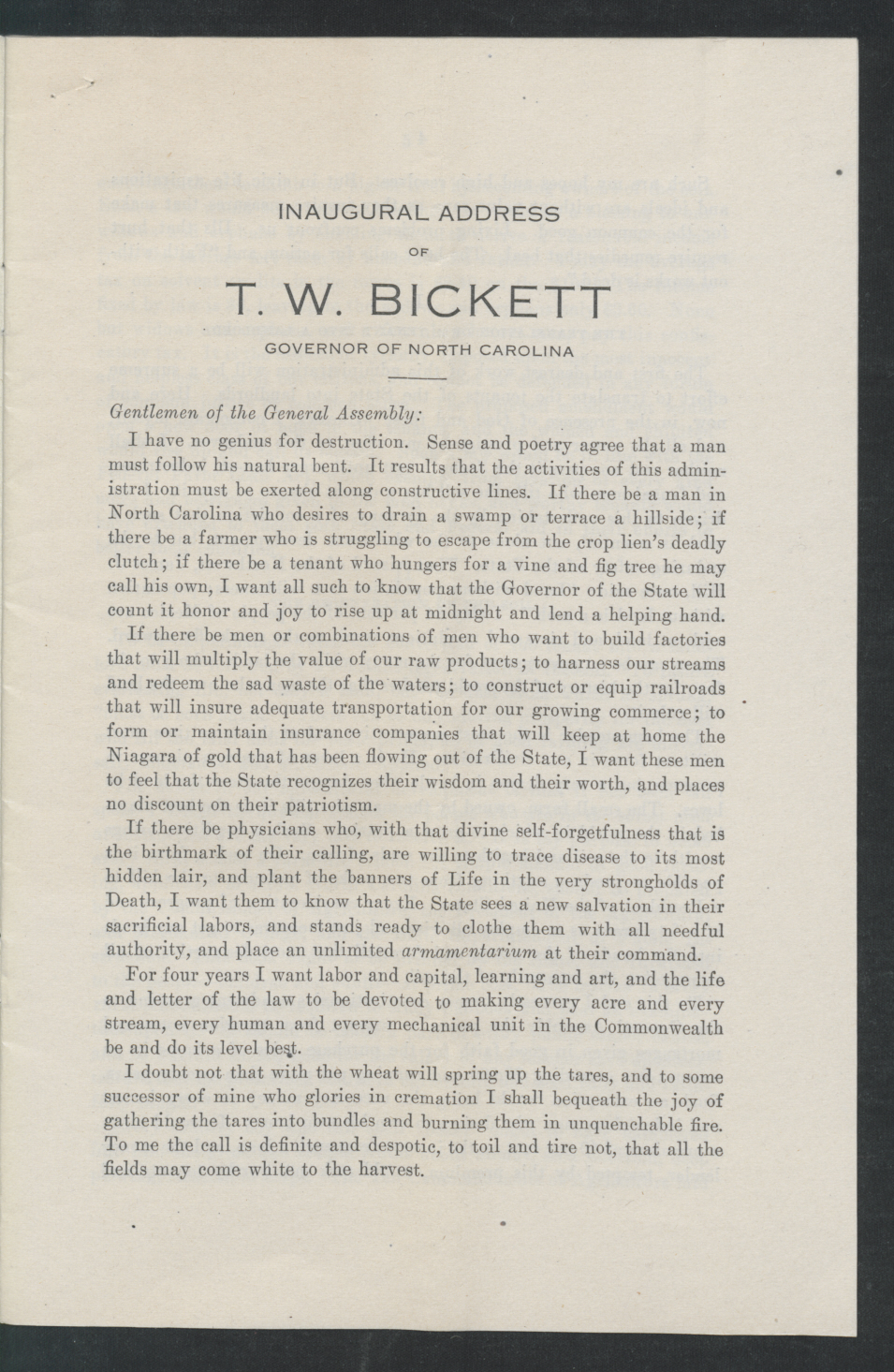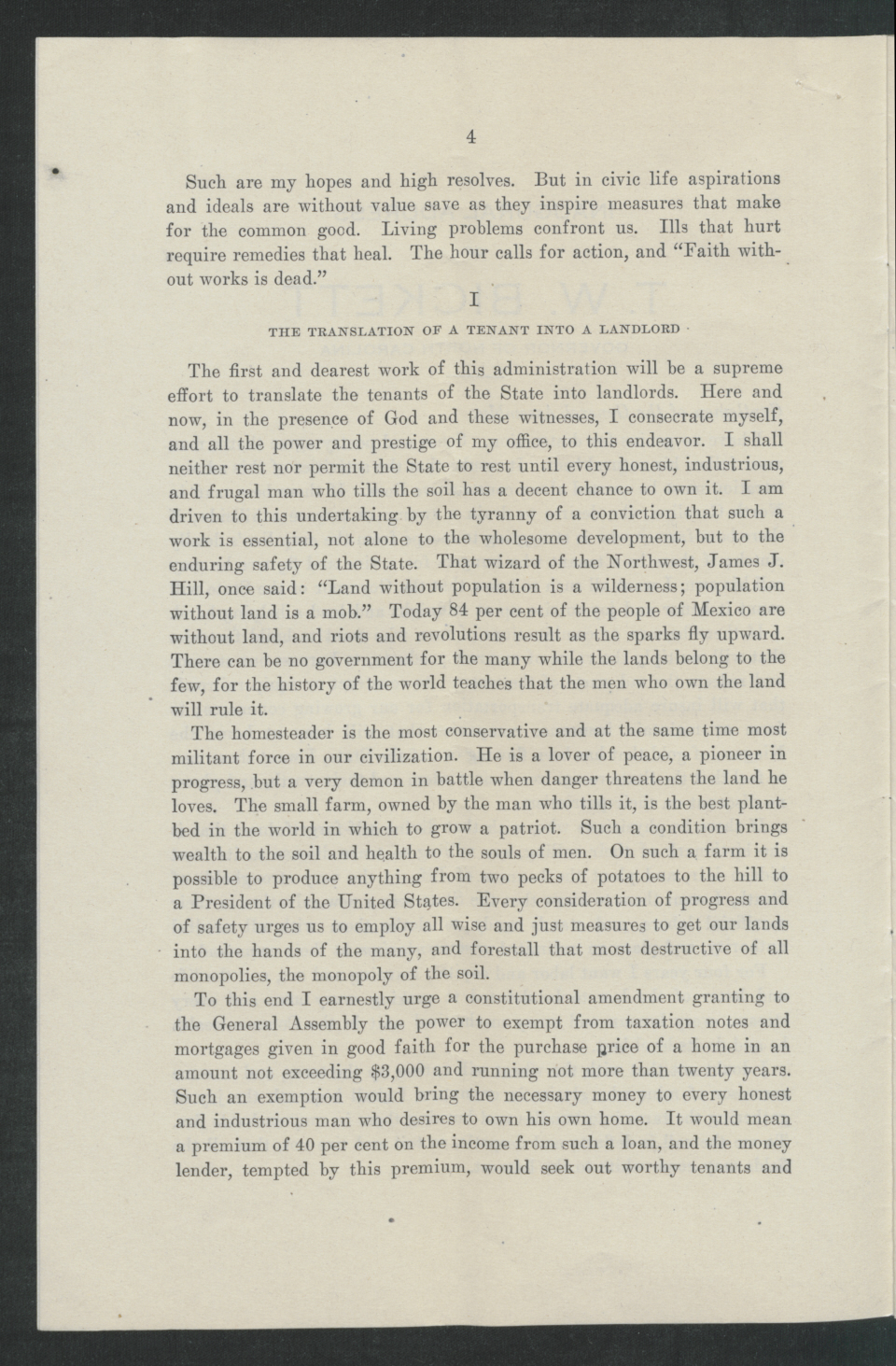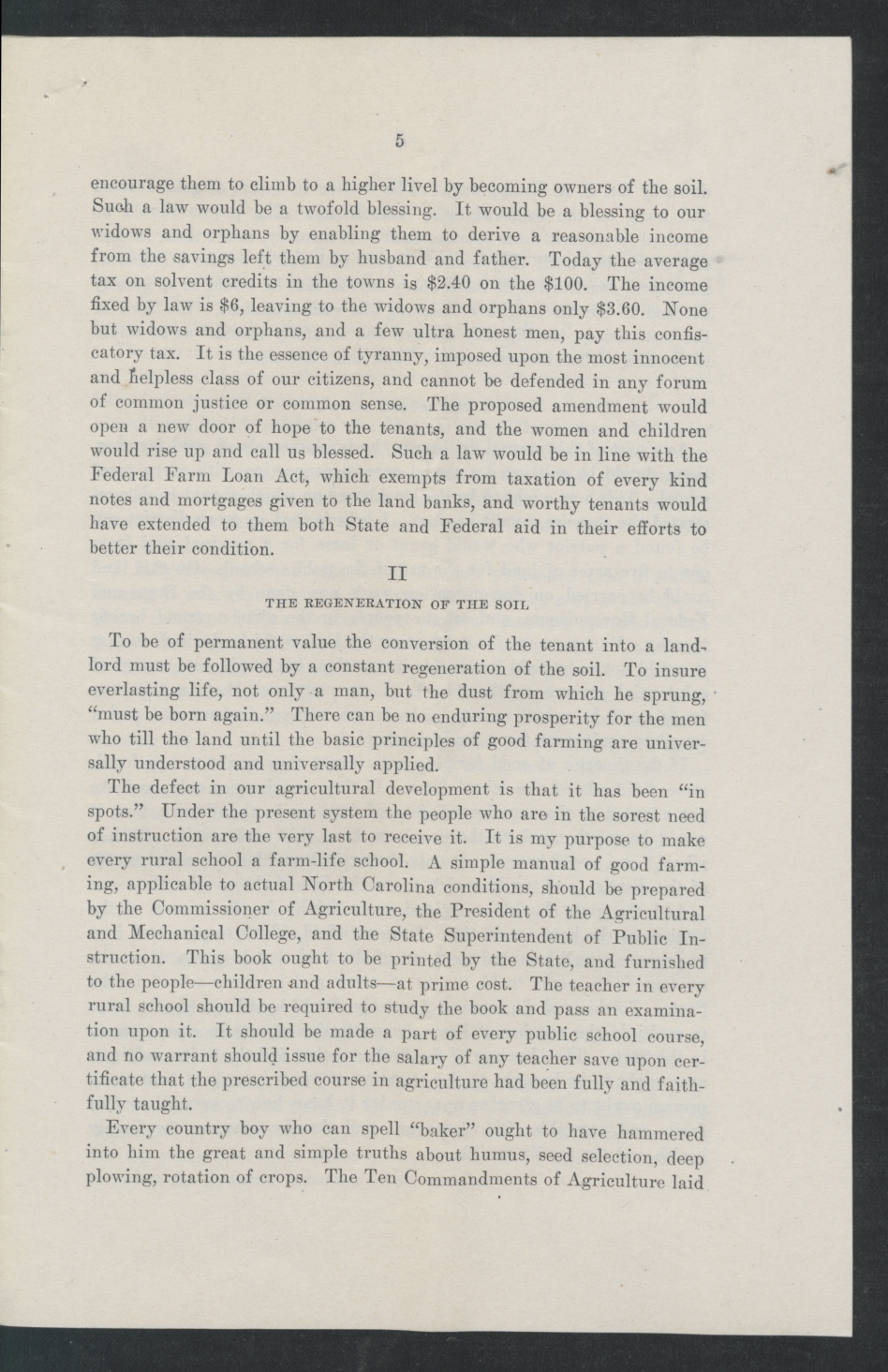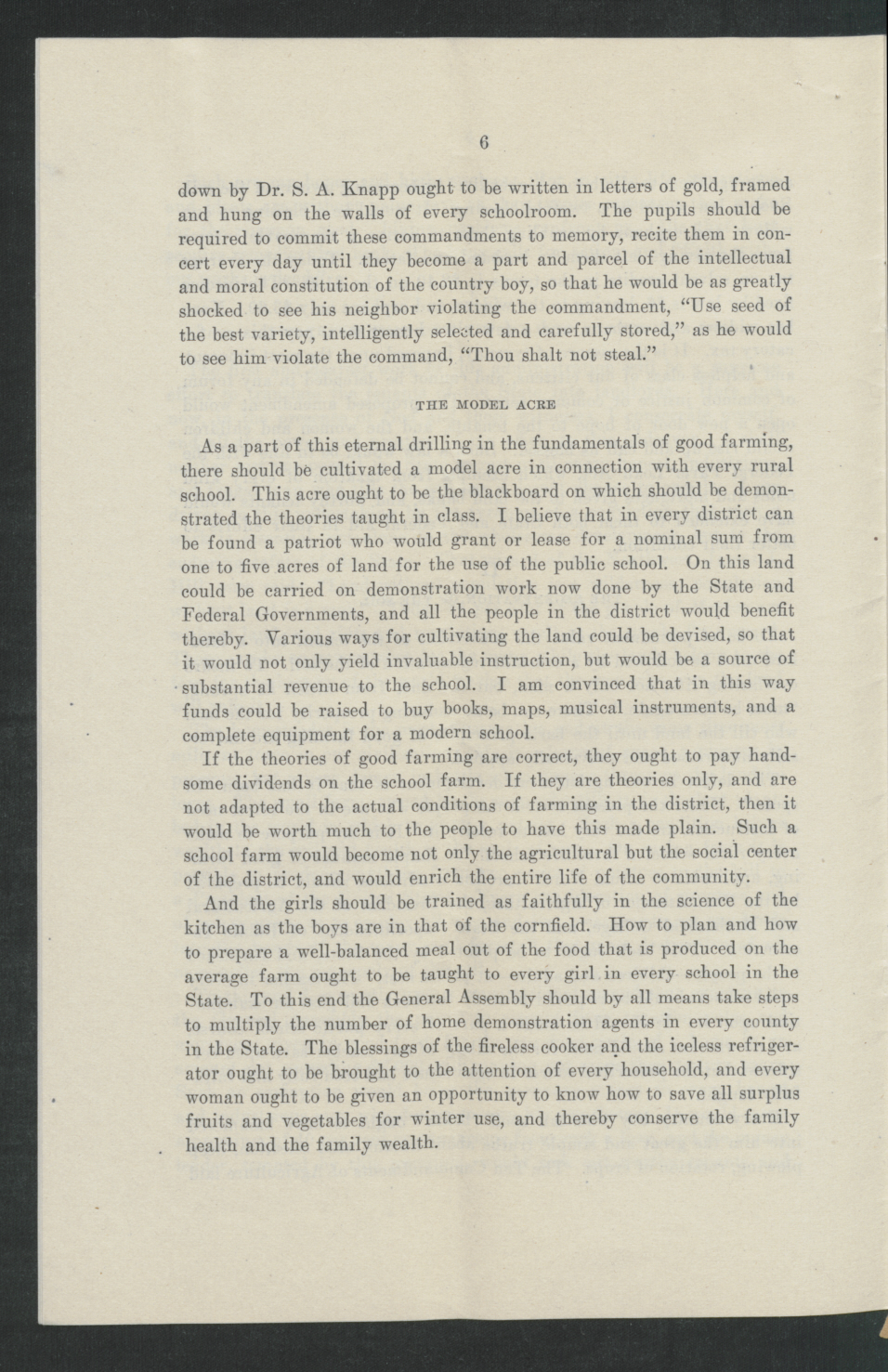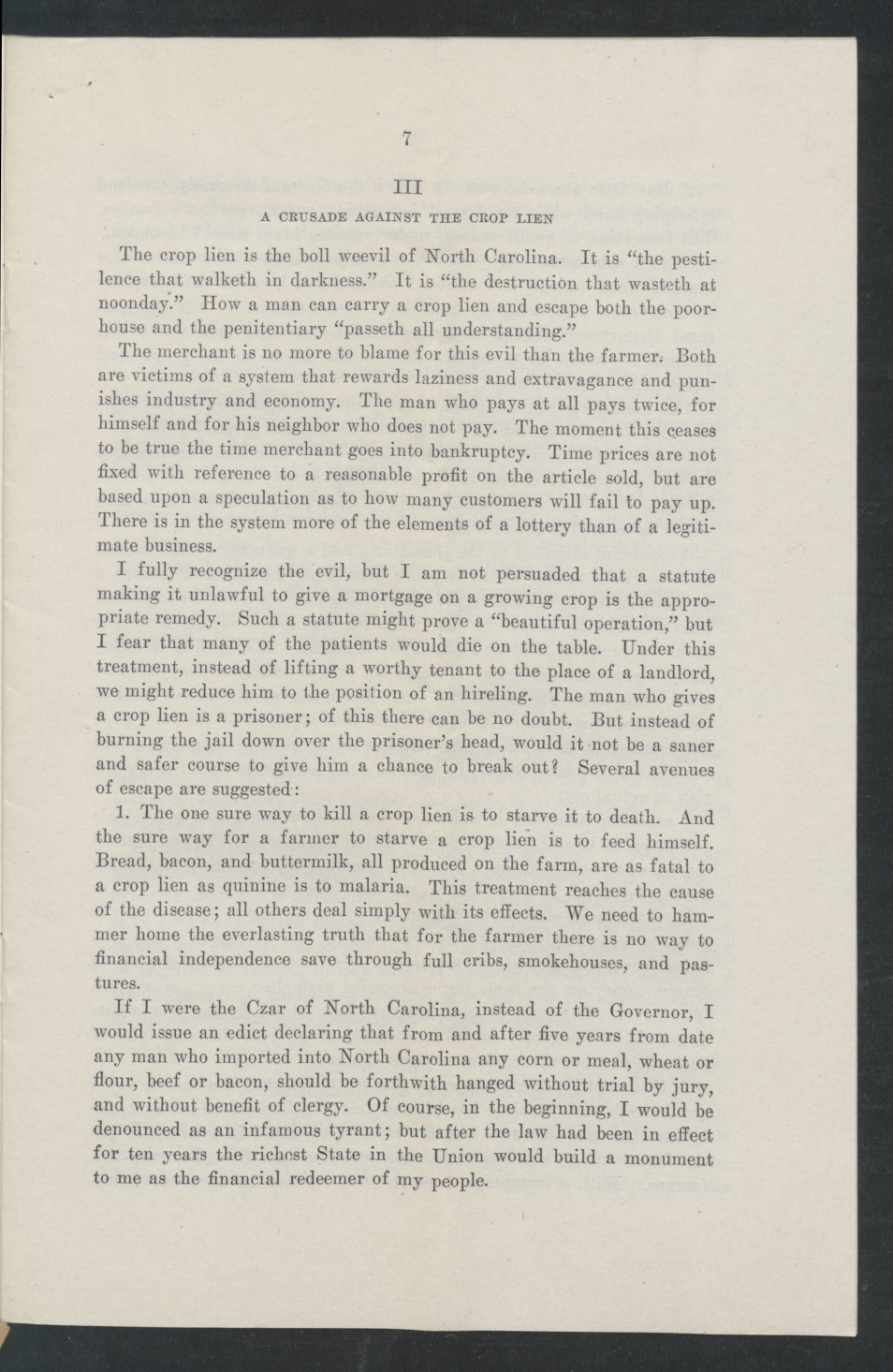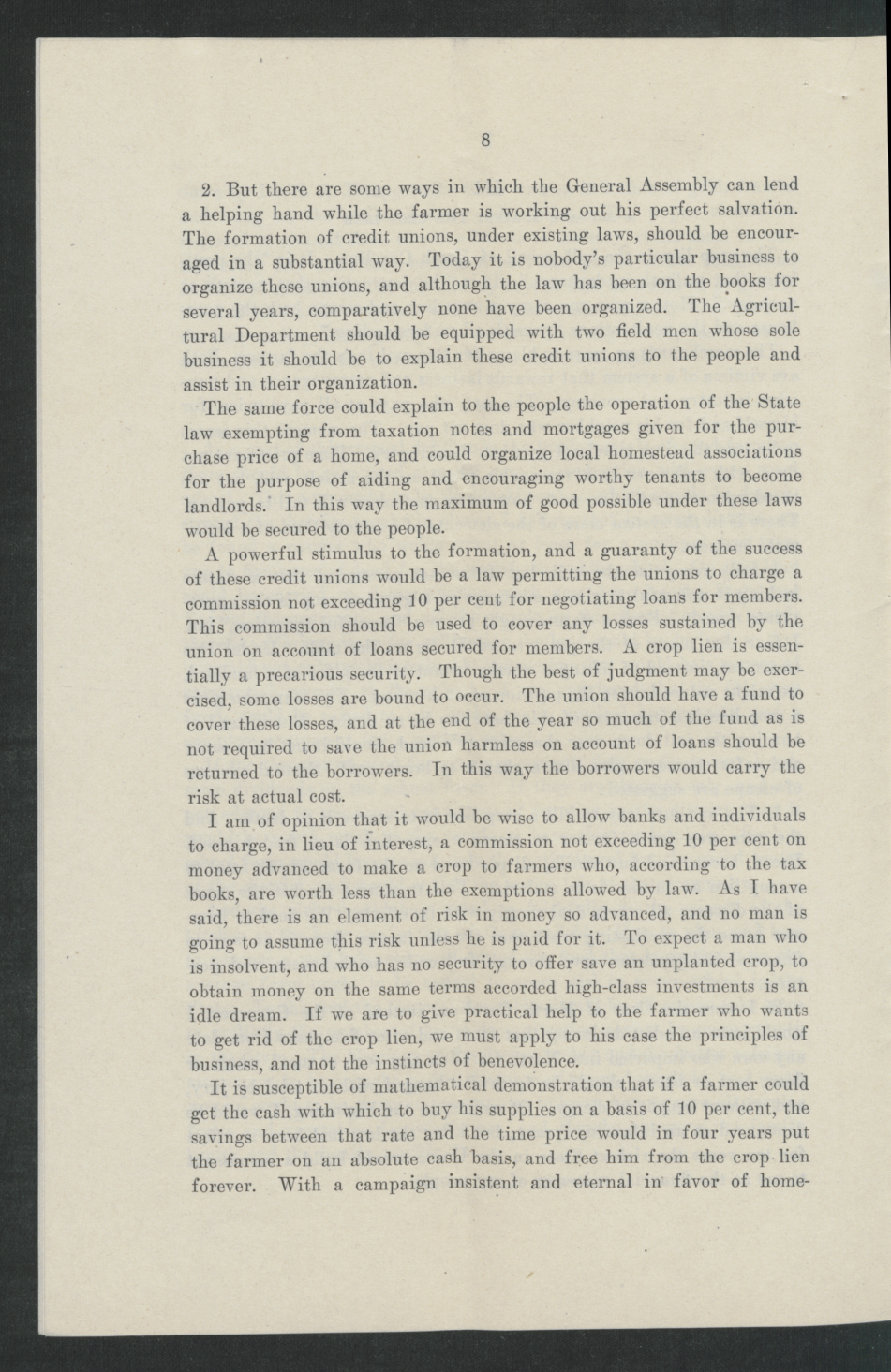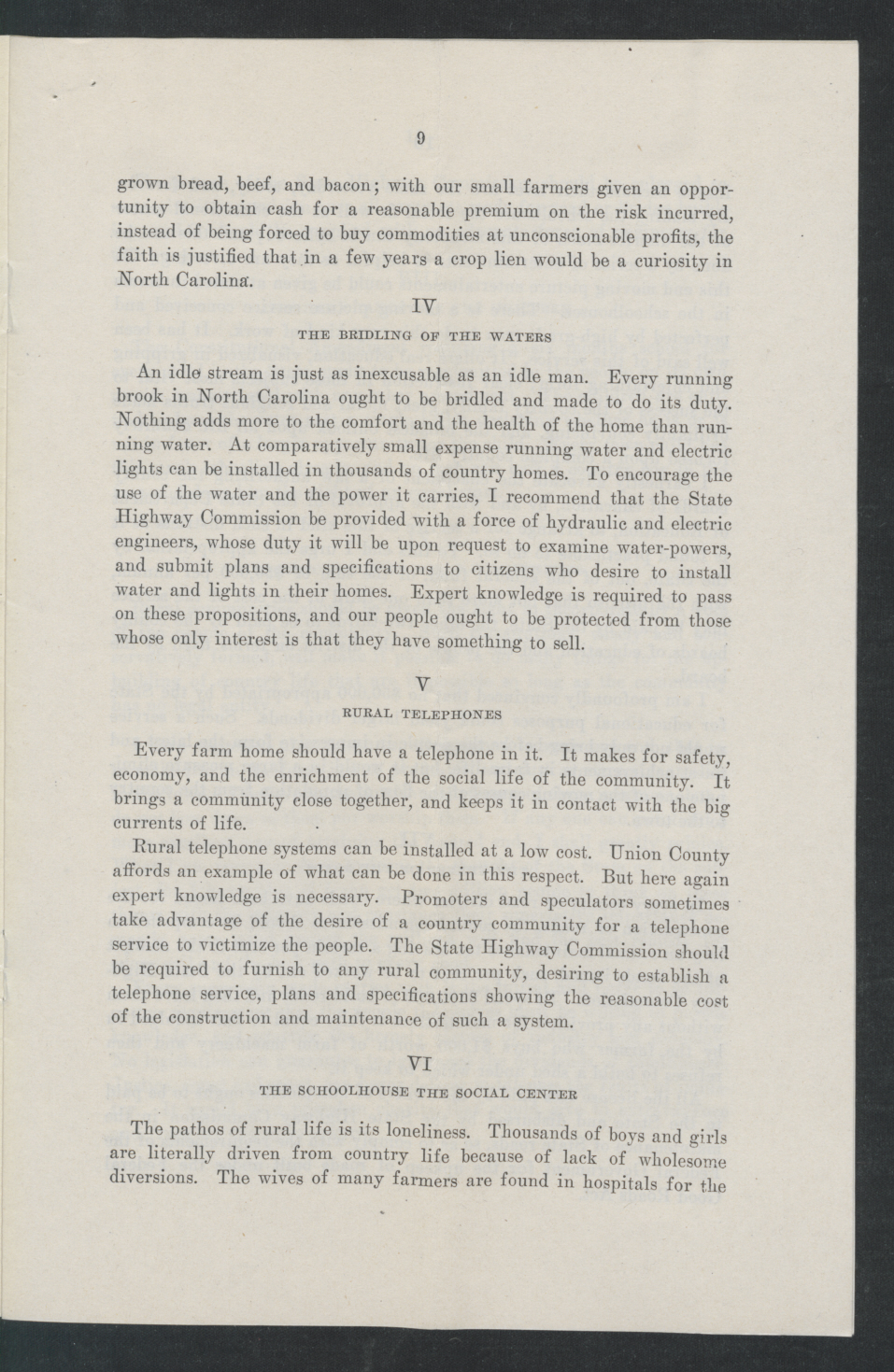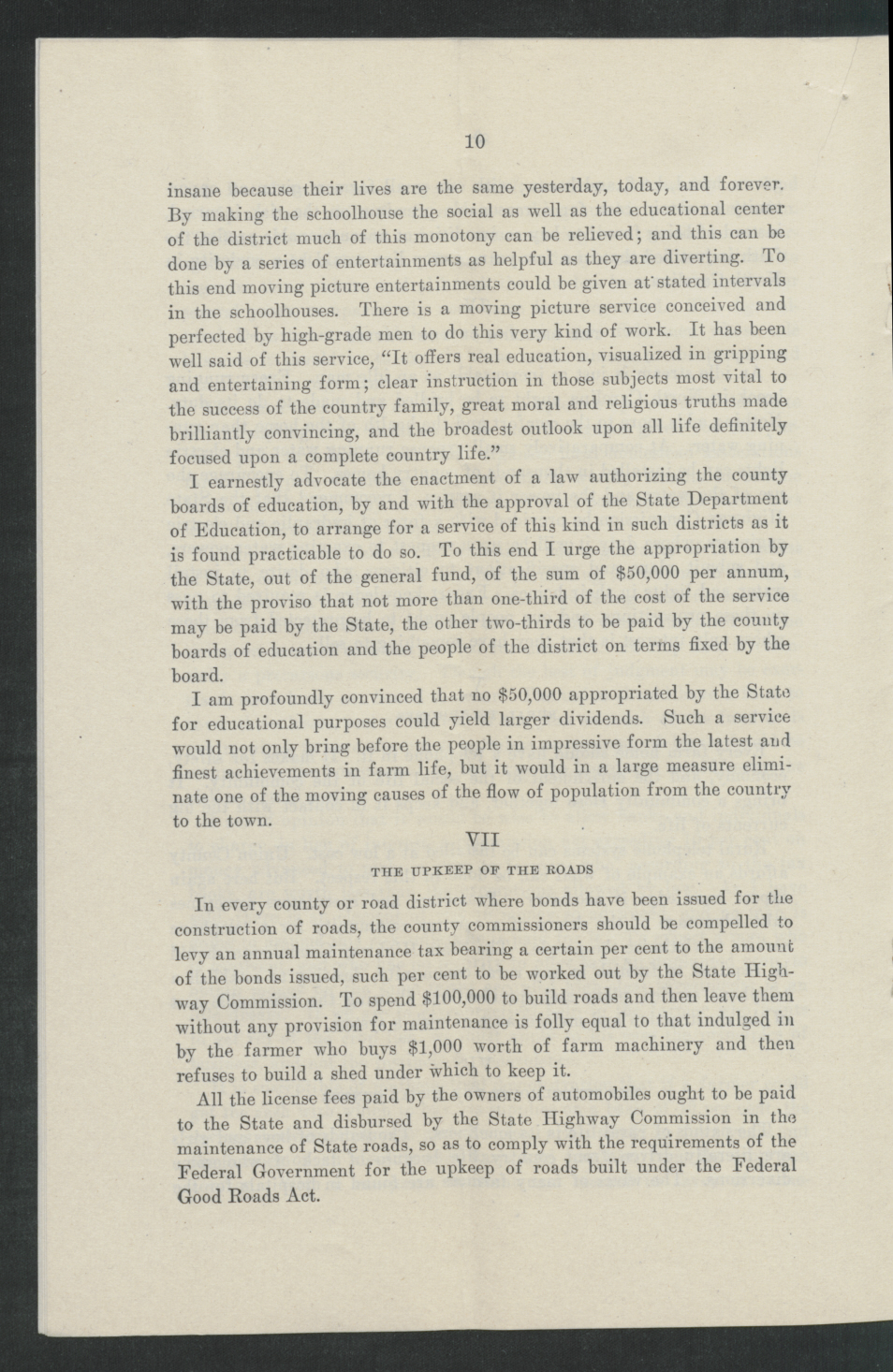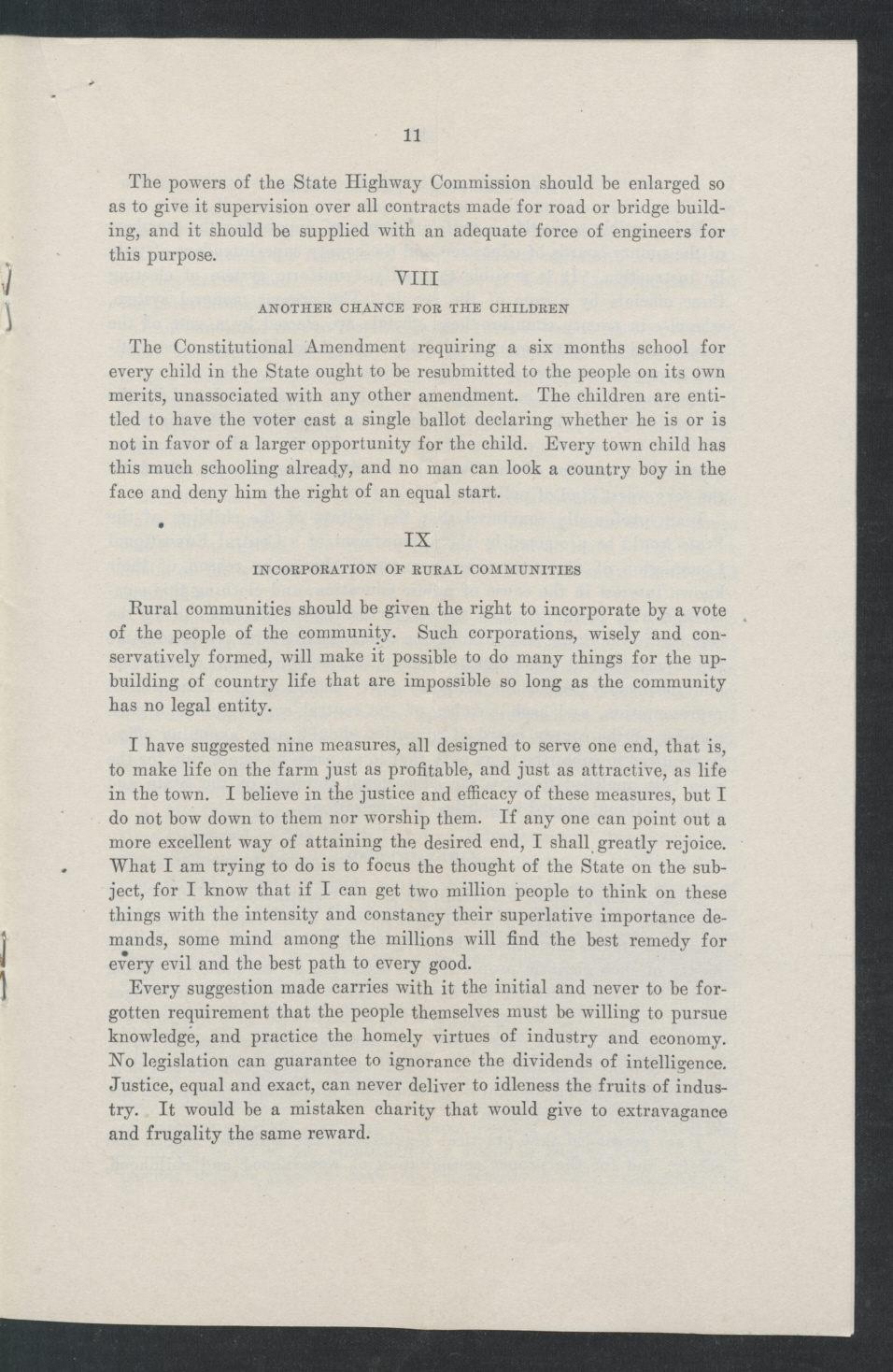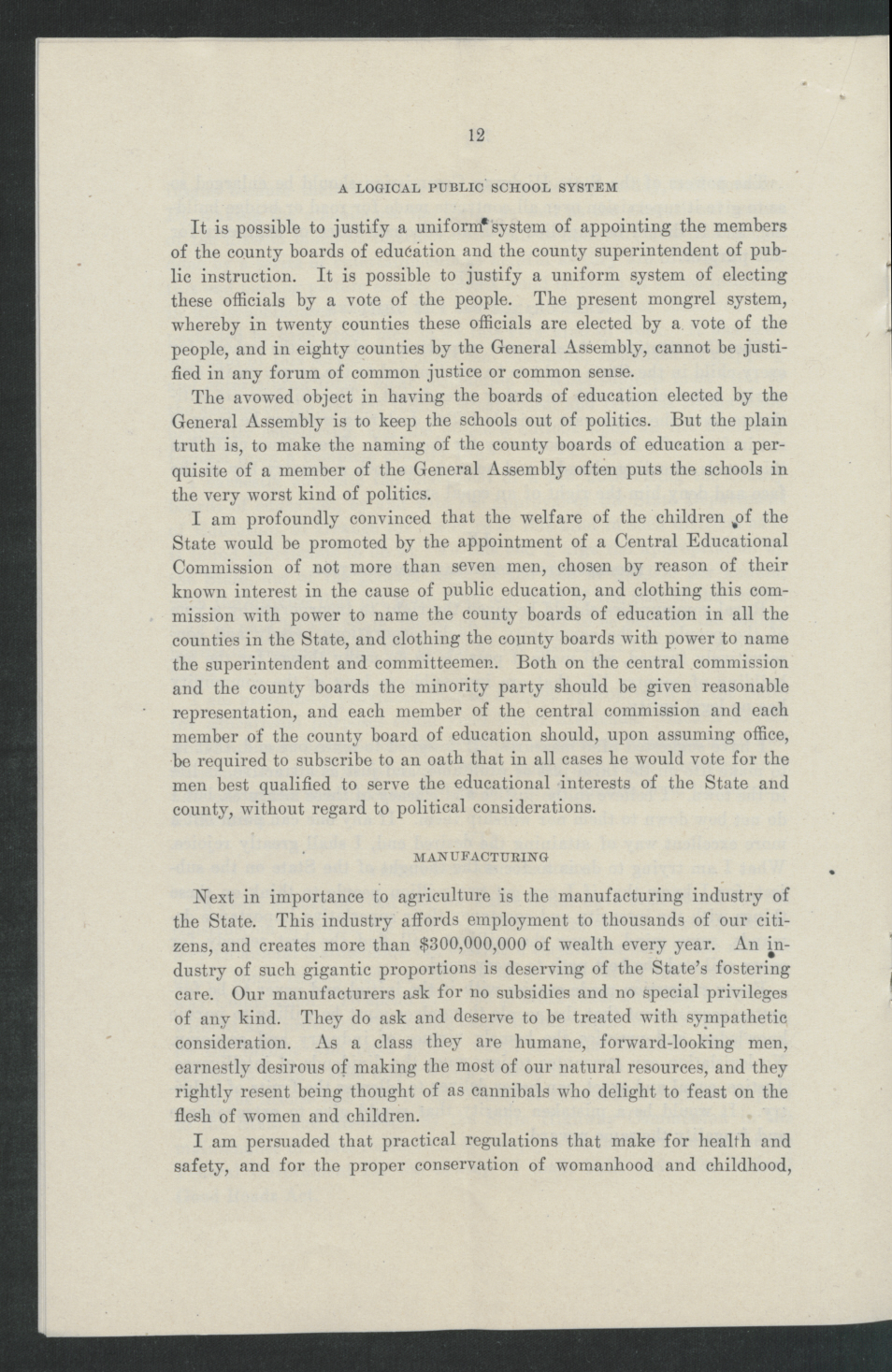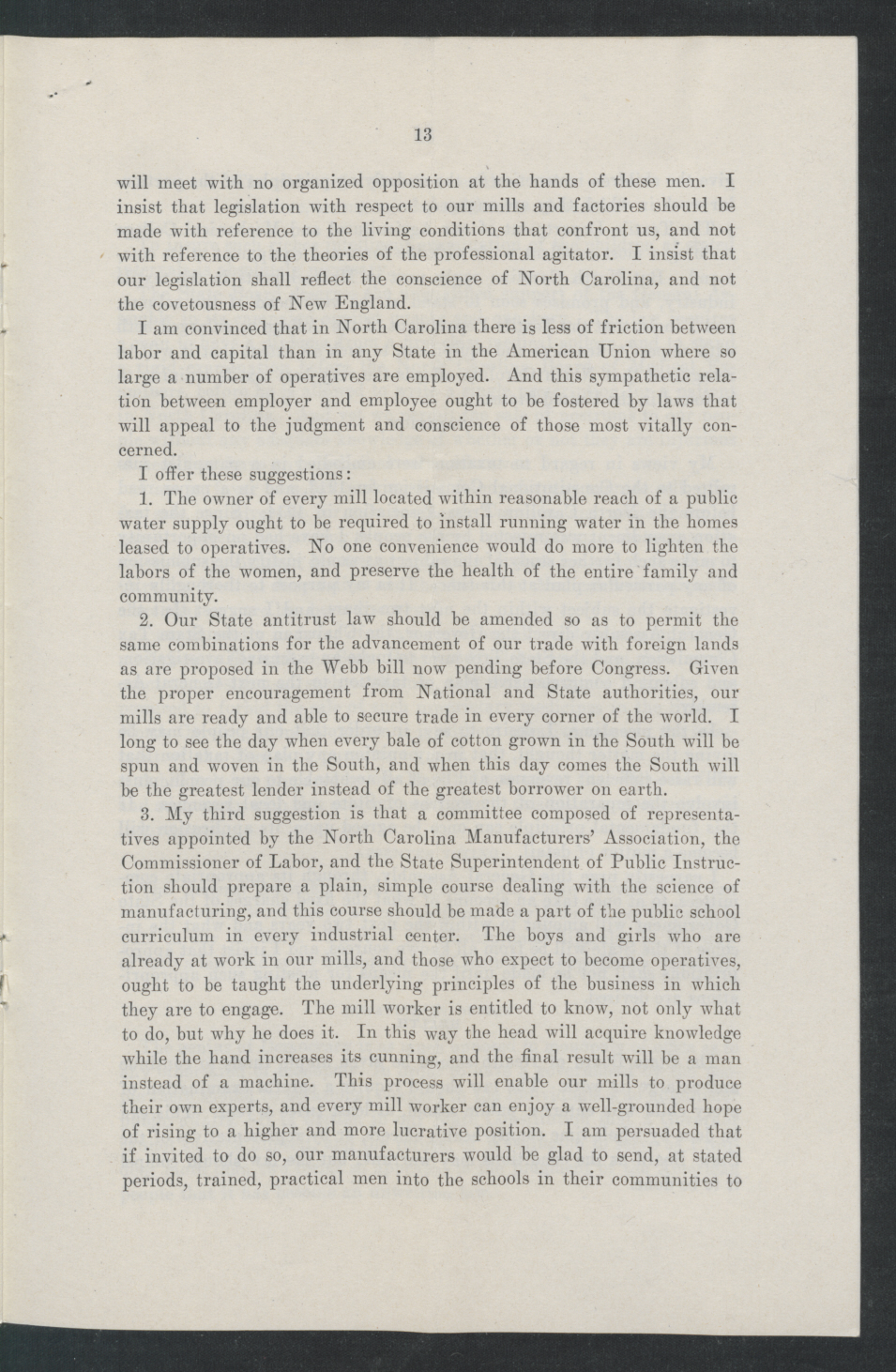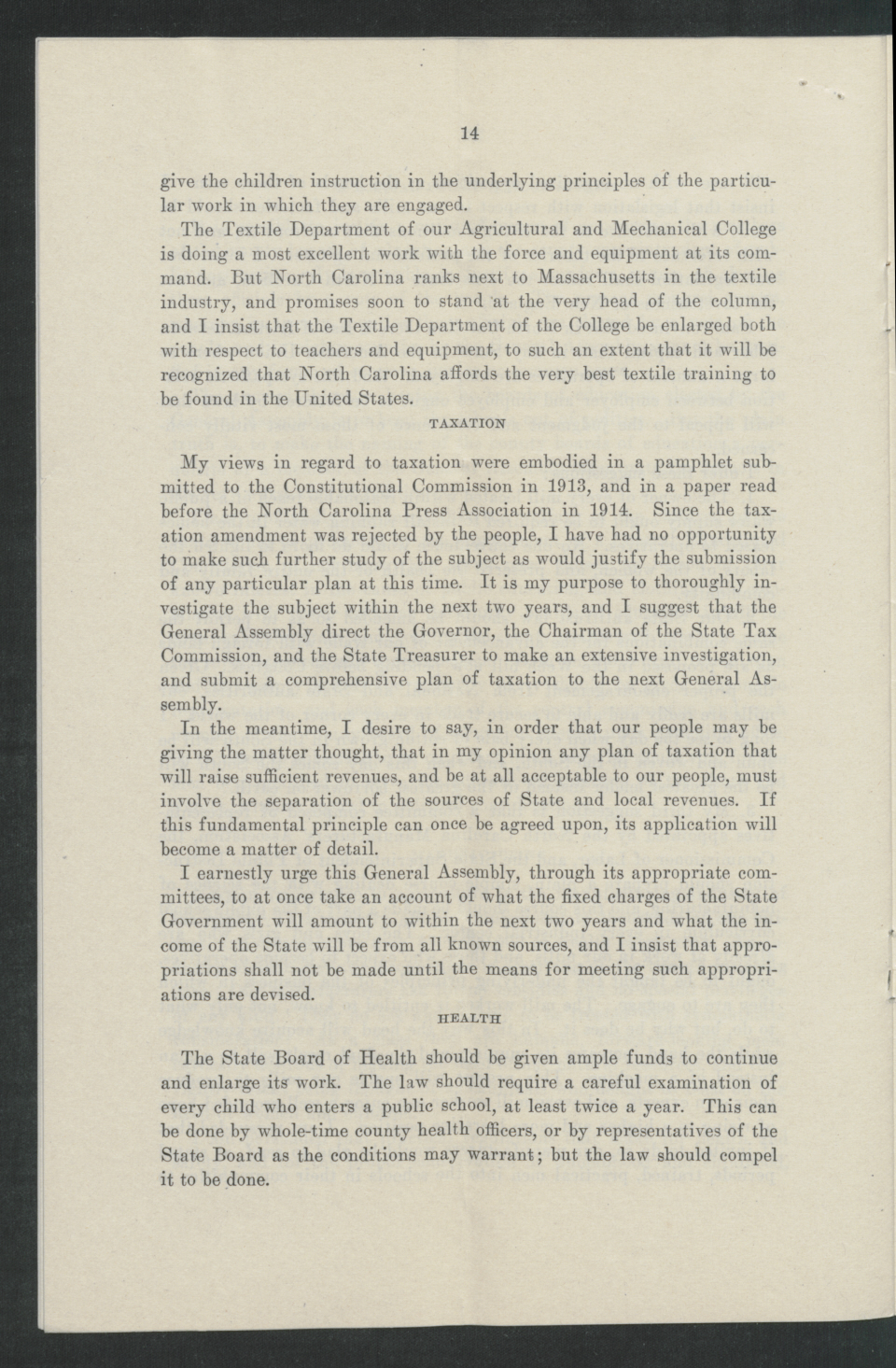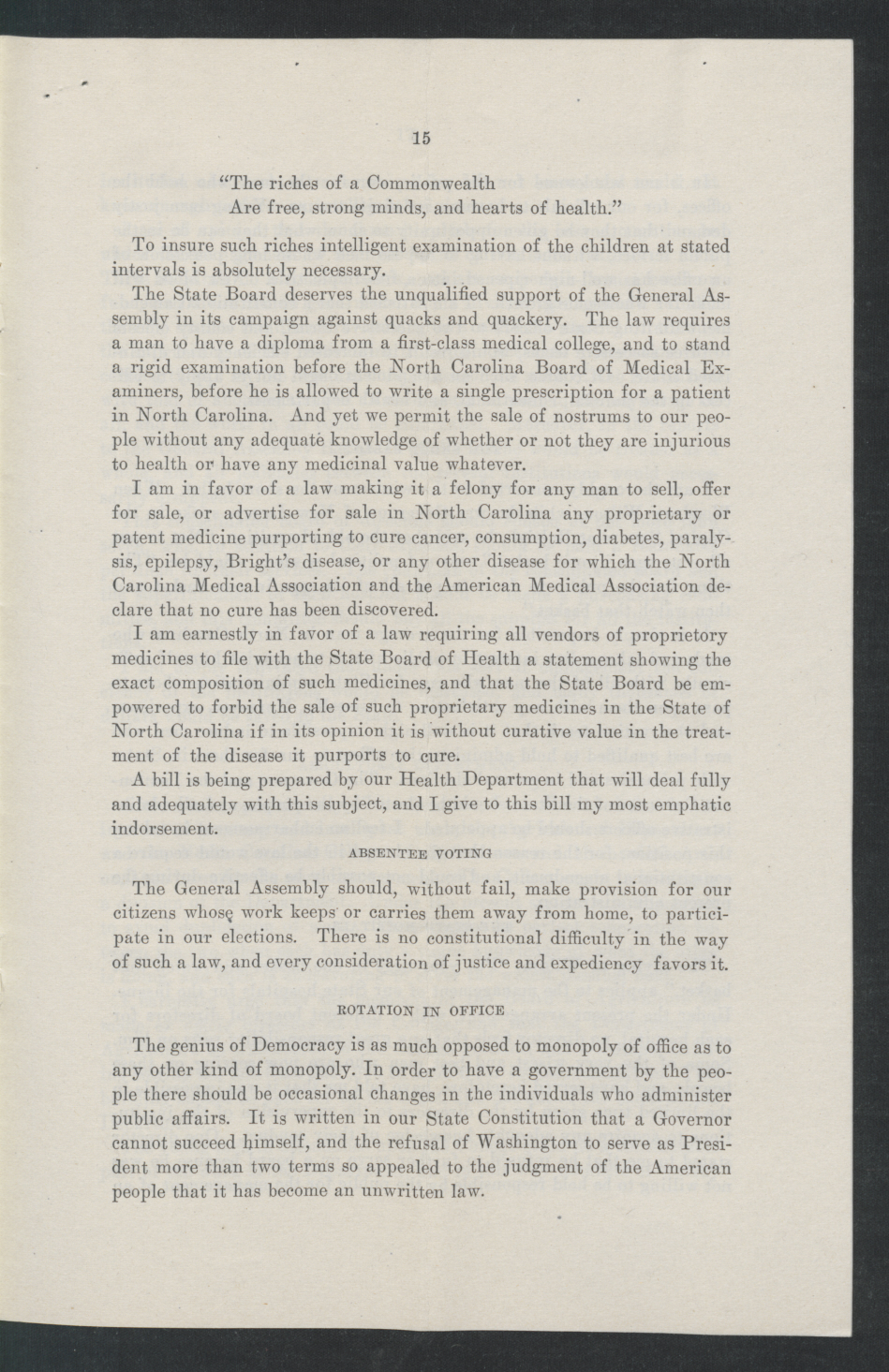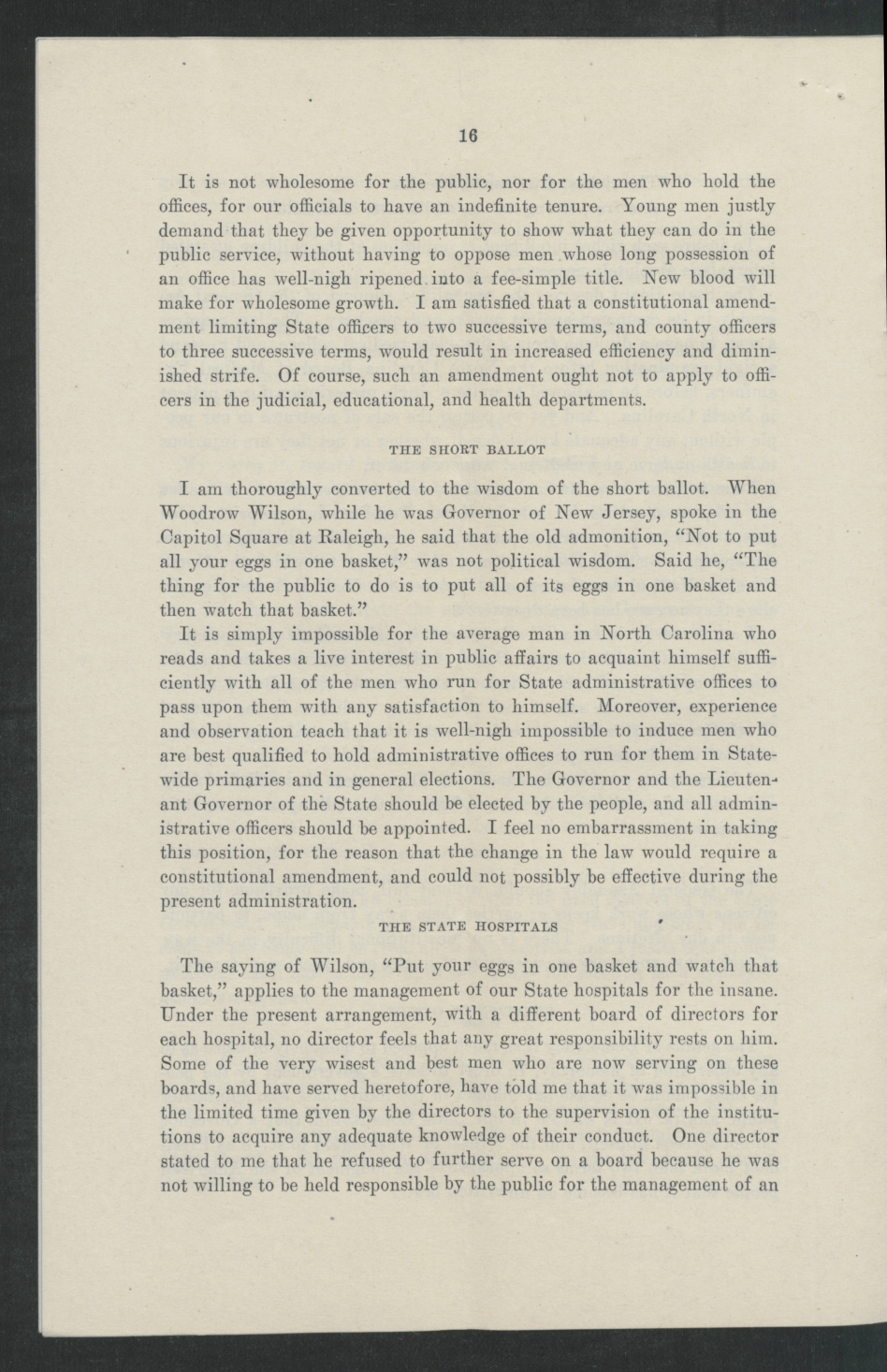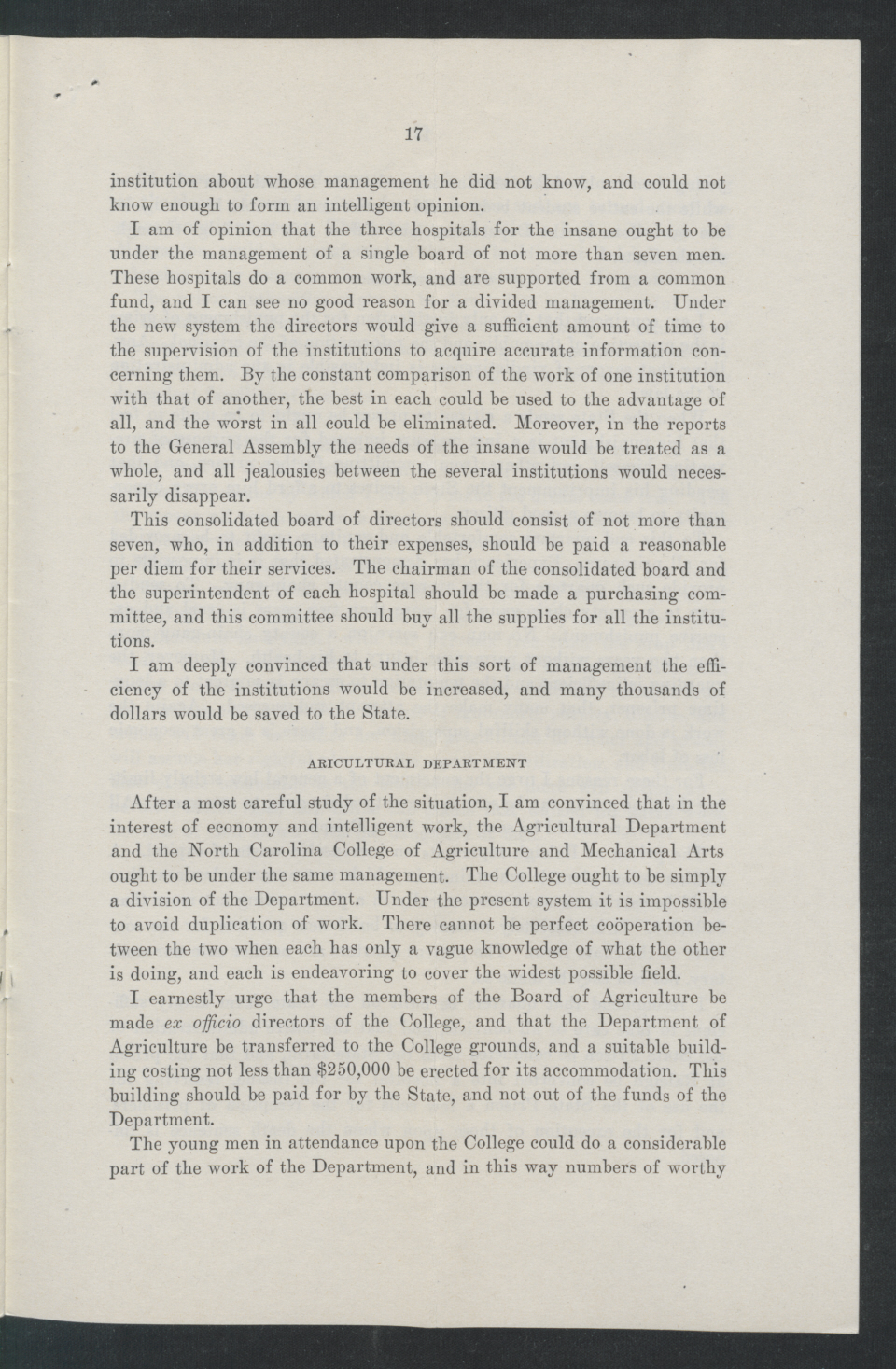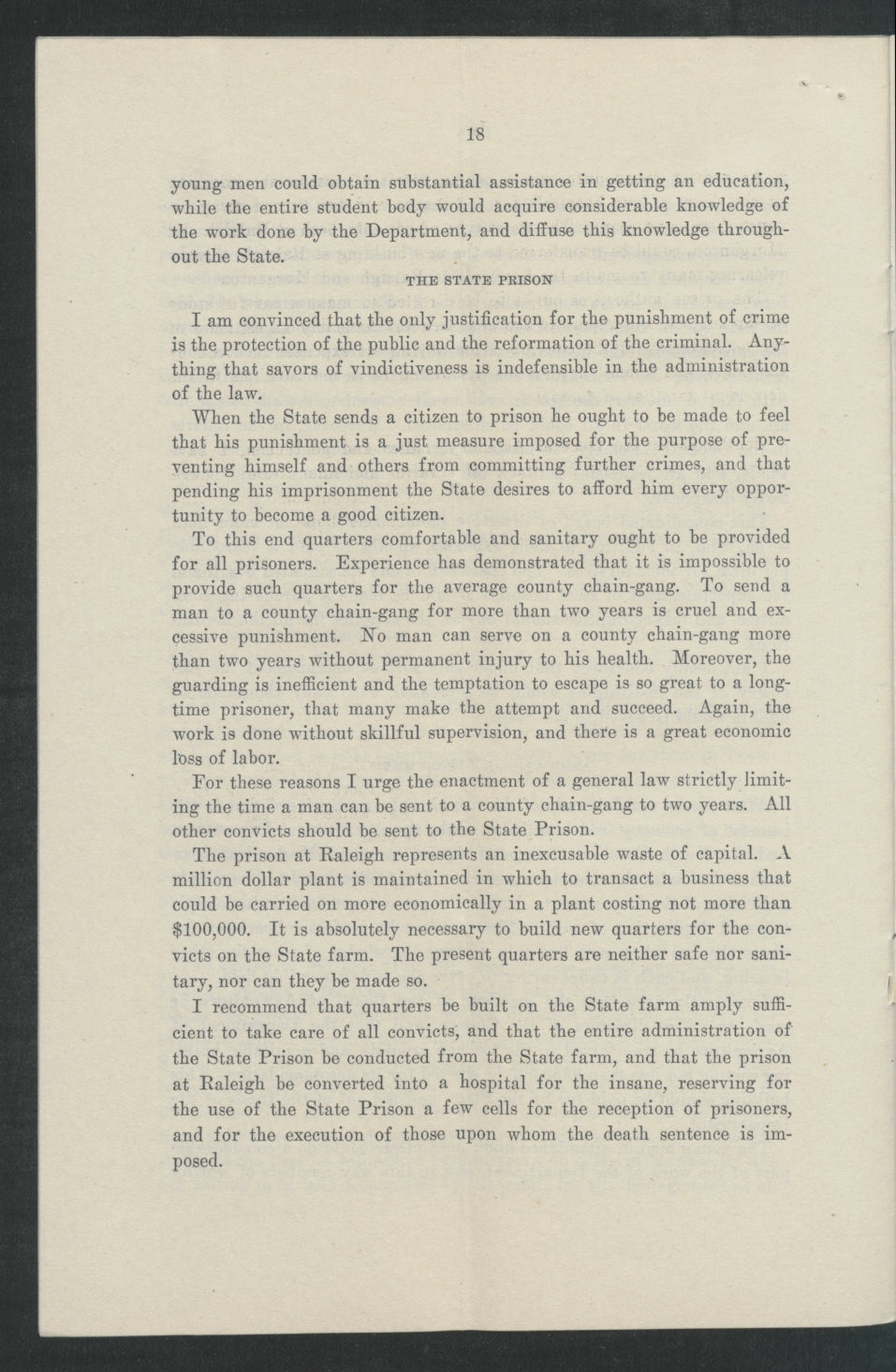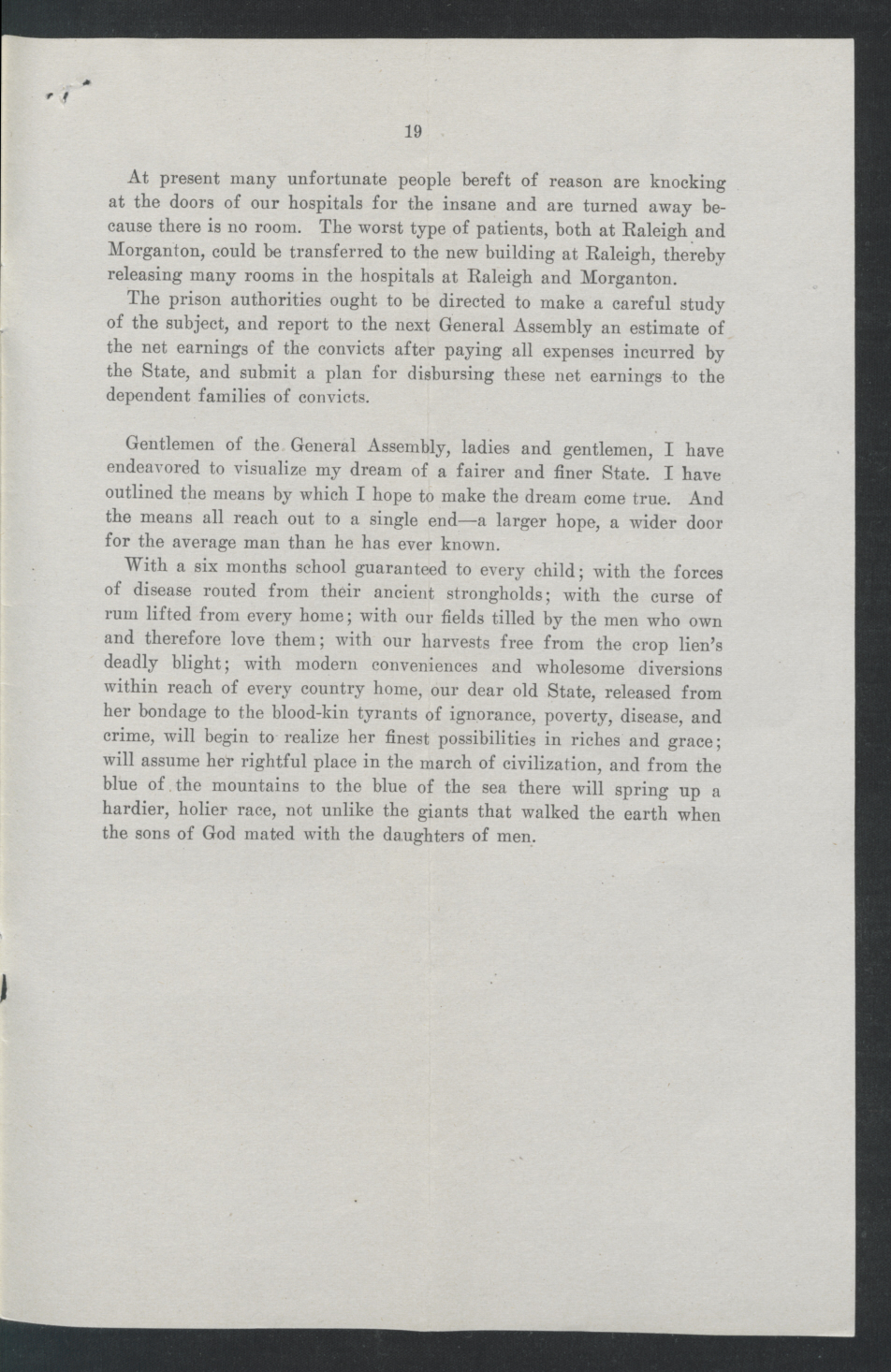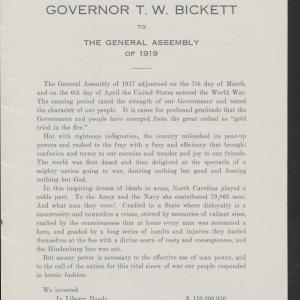INAUGURAL ADDRESS
OF
T. W. BICKETT
GOVERNOR OF NORTH CAROLINA
Gentlemen of the General Assembly:
I have no genius for destruction. Sense and poetry agree that a man must follow his natural bent. It results that the activities of this administration must be exerted along constructive lines. If there be a man in North Carolina who desires to drain a swamp or terrace a hillside; if there be a farmer who is struggling to escape from the crop lien's deadly clutch; if there be a tenant who hungers for a vine and fig tree he may call his own, I want all such to know that the Governor of the State will count it honor and joy to rise up at midnight and lend a helping hand.
If there be men or combinations of men who want to build factories that will multiply the value of our raw products; to harness our streams and redeem the sad waste of the waters; to construct or equip railroads that will insure adequate transportation for our growing commerce; to form or maintain insurance companies that will keep at home the Niagara of gold that has been flowing out of the State, I want these men to feel that the State recognizes their wisdom and their worth, and places no discount on their patriotism.
If there be physicians who, with that divine self-forgetfulness that is the birthmark of their calling, are willing to trace disease to its most hidden lair, and plant the banners of Life in the very strongholds of Death, I want them to know that the State sees a new salvation in their sacrificial labors, and stands ready to clothe them with all needful authority, and place an unlimited armamentarium at their command.
For four years I want labor and capital, learning and art, and the life and letter of the law to be devoted to making every acre and every stream, every human and every mechanical unit in the Commonwealth be and do its level best.
I doubt not that with the wheat will spring up the tares, and to some successor of mine who glories in cremation I shall bequeath the joy of gathering the tares into bundles and burning them in unquenchable fire. To me the call is definite and despotic, to toil and tire not, that all the fields may come white to the harvest.
Such are my hopes and high resolves. But in civic life aspirations and ideals are without value save as they inspire measures that make for the common good. Living problems confront us. Ills that hurt require remedies that heal. The hour calls for action, and "Faith without works is dead."
I
THE TRANSLATION OF A TENANT INTO A LANDLORD
The first and dearest work of this administration will be a supreme effort to translate the tenants of the State into landlords. Here and now, in the presence of God and these witnesses, I consecrate myself, and all the power and prestige of my office, to this endeavor. I shall neither rest nor permit the State to rest until every honest, industrious, and frugal man who tills the soil has a decent chance to own it. I am driven to this undertaking by the tyranny of a conviction that such a work is essential, not alone to the wholesome development, but to the enduring safety of the State. That wizard of the Northwest, James J. Hill, once said: "Land without population is a wilderness; population without land is a mob." Today 84 per cent of the people of Mexico are without land, and riots and revolutions result as the sparks fly upward. There can be no government for the many while the lands belong to the few, for the history of the world teaches that the men who own the land will rule it.
The homesteader is the most conservative and at the same time most militant force in our civilization. He is a lover of peace, a pioneer in progress, but a very demon in battle when danger threatens the land he loves. The small farm, owned by the man who tills it, is the best plant-bed in the world in which to grow a patriot. Such a condition brings wealth to the soil and health to the souls of men. On such a farm it is possible to produce anything from two pecks of potatoes to the hill to a President of the United States. Every consideration of progress and of safety urges us to employ all wise and just measures to get our lands into the hands of the many, and forestall that most destructive of all monopolies, the monopoly of the soil.
To this end I earnestly urge a constitutional amendment granting to the General Assembly the power to exempt from taxation notes and mortgages given in good faith for the purchase price of a home in an amount not exceeding $3,000 and running not more than twenty years. Such an exemption would bring the necessary money to every honest and industrious man who desires to own his own home. It would mean a premium of 40 per cent on the income from such a loan, and the money lender, tempted by this premium, would seek out worthy tenants and encourage them to climb to a higher livel by becoming owners of the soil. Such a law would be a twofold blessing. It would be a blessing to our widows and orphans by enabling them to derive a reasonable income from the savings left them by husband and father. Today the average tax on solvent credits in the towns is $2.40 on the $100. The income fixed by law is $6, leaving to the widows and orphans only $3.60. None but widows and orphans, and a few ultra honest men, pay this confiscatory tax. It is the essence of tyranny, imposed upon the most innocent and helpless class of our citizens, and cannot be defended in any forum of common justice or common sense. The proposed amendment would open a door of hope to the tenants, and the women and children would rise up and call us blessed. Such a law would be in line with the Federal Farm Loan Act, which exempts from taxation of every kind notes and mortgages given to the land banks, and worthy tenants would have extended to them both State and Federal aid in their efforts to better their condition.
II
THE REGENERATION OF THE SOIL
To be of permanent value the conversion of the tenant into a landlord must be followed by a constant regeneration of the soil. To insure everlasting life, not only a man, but the dust from which he sprung, "must be born again." There can be no enduring prosperity for the men who till the land until the basic principles of good farming are universally understood and universally applied.
The defect in our agricultural development is that it has been "in spots." Under the present system the people who are in the sorest need of instruction are the very last to receive it. It is my purpose to make every rural school a farm-life school. A simple manual of good farming, applicable to actual North Carolina conditions, should be prepared by the Commissioner of Agriculture, the President of the Agricultural and Mechanical College, and the State Superintendent of Public Instruction. This book ought to be printed by the State, and furnished to the people — children and adults — at prime cost. The teacher in every rural school should be required to study the book and pass an examination upon it. It should be made a part of every public school course, and no warrant should issue for the salary of any teacher save upon certificate that the prescribed course in agriculture had been fully and faithfully taught.
Every country boy who can spell "baker" ought to have hammered into him the great and simple truths about humus, seed selection, deep plowing, rotation of crops. The Ten Commandments of Agriculture laid down by Dr. S. A. Knapp ought to be written in letters of gold, framed and hung on the walls of every schoolroom. The pupils should be required to commit these commandments to memory, recite them in concert every day until they become a part and parcel of the intellectual and moral constitution of the country boy, so that he would be as greatly shocked to see his neighbor violating the commandment, "Use seed of the best variety intelligently selected and carefully stored," as he would to see him violate the command, "Thou shalt not steal."
THE MODEL ACRE
As a part of this eternal drilling in the fundamentals of good farming, there should be cultivated a model acre in connection with every rural school. This acre ought to be the blackboard on which should be demonstrated the theories taught in class. I believe that in every district can be found a patriot who would grant or lease for a nominal sum from one to five acres of land for the use of the public school. On this land could be carried on demonstration work now done by the State and Federal Governments, and all the people in the district would benefit thereby. Various ways for cultivating the land could be devised, so that it would not only yield invaluable instruction, but would be a source of substantial revenue to the school. I am convinced that in this way funds could be raised to buy books, maps, musical instruments, and a complete equipment for a modern school.
If the theories of good farming are correct, they ought to pay handsome dividends on the school farm. If they are theories only, and are not adapted to the actual conditions of farming in the district, then it would be worth much to the people to have this made plain. Such a school farm would become not only the agricultural but the social center of the district, and would enrich the entire life of the community.
And the girls should be trained as faithfully in the science of the kitchen as the boys are in that of the cornfield. How to plan and how to prepare a well-balanced meal out of the food that is produced on the average farm ought to be taught to every girl in every school in the State. To this end the General Assembly should by all means take steps to multiply the number of home demonstration agents in every county in the State. The blessings of the fireless cooker and the iceless refrigerator ought to be brought to the attention of every household, and every woman ought to be given an opportunity to know how to save all the surplus fruits and vegetables for winter use, and thereby conserve the family health and the family wealth.
III
A CRUSADE AGAINST THE CROP LIEN
The crop lien is the boll weevil of North Carolina. It is "the pestilence that walketh in darkness." It is "the destruction that wasteth at noonday." How a man can carry a crop lien and escape both the poorhouse and the penitentiary "passeth all understanding."
The merchant is no more to blame for this evil than the farmer. Both are victims of a system that rewards laziness and extravagance and punishes industry and economy. The man who pays at all pays twice, for himself and for his neighbor who does not pay. The moment this ceases to be true the time merchant goes into bankruptcy. Time prices are not fixed with reference to a reasonable profit on the article sold, but are based upon a speculation as to how many customers will fail to pay up. There is in the system more of the elements of a lottery than of a legitimate business.
I fully recognize the evil, but I am not persuaded that a statute making it unlawful to give a mortgage on a growing crop is the appropriate remedy. Such a statute might prove a "beautiful operation," but I fear that many of the patients would die on the table. Under this treatment, instead of lifting a worthy tenant to the place of a landlord, we might reduce him to the position of a hireling. The man who gives a crop lien is a prisoner; of this there can be no doubt. But instead of burning the jail down over the prisoner's head, would it not be a saner and safer course to give him a chance to break out? Several avenues of escape are suggested:
1. The one sure way to kill a crop lien is to starve it to death. And the sure way for a farmer to starve a crop lien is to feed himself. Bread, bacon, and buttermilk, all produced on the farm, are as fatal to a crop lien as quinine is to malaria. This treatment reaches the cause of the disease; all others deal simply with the effects. We need to hammer home the everlasting truth that for the farmer there is no way to financial independence save through full cribs, smokehouses, and pastures.
If I were the Czar of North Carolina, instead of the Governor, I would issue an edict declaring that from and after five years from date any man who imported into North Carolina any corn or meal, wheat or flour, beef or bacon, should be forthwith hanged without trial by jury, and without benefit of clergy. Of course, in the beginning, I would be denounced as an infamous tyrant; but after the law had been in effect for ten years the richest State in the Union would build a monument to me as the financial redeemer of my people.
2. But there are some ways in which the General Assembly can lend a helping hand while the farmer is working out his perfect salvation. The formation of credit unions, under existing laws, should be encouraged in a substantial way. Today it is nobody's particular business to organize these unions, and although the law has been on the books for several years, comparatively none have been organized. The Agricultural Department should be equipped with two field men whose sole business it should be to explain these credit unions to the people and assist in their organization.
The same force could explain to the people the operation of the State law exempting from taxation notes and mortgages given for the purchase price of a home, and could organize local homestead associations for the purpose of aiding and encouraging worthy tenants to become landlords. In this way the maximum of good possible under these laws would be secured to the people.
A powerful stimulus to the formation, and a guaranty of the success of these credit unions would be a law permitting the unions to charge a commission not exceeding 10 per cent for negotiating loans for members. This commission should be used to cover any losses sustained by the union on account of loans secured for members. A crop lien is essentially a precarious security. Though the best of judgment may be exercised, some losses are bound to occur. The union should have a fund to cover these losses, and at the end of the year so much of the fund as is not required to save the union harmless on account of loans should be returned to the borrowers. In this way borrowers would carry the risk at actual cost.
I am of opinion that it would be wise to allow banks and individuals to charge, in lieu of interest, a commission not exceeding 10 per cent on money advanced to make a crop to farmers who, according to the tax books, are worth less than the exemptions allowed by law. As I have said, there is an element of risk in money so advanced, and no man is going to assume this risk unless he is paid for it. To expect a man who is insolvent, and who has no security to offer save an unplanted crop, to obtain money on the same terms accorded high-class investments is an idle dream. If we are to give practical help to the farmer who wants to get rid of the crop lien, we must apply to his case the principles of business, and not the instincts of benevolence.
It is susceptible of mathematical demonstration that if a farmer could get the cash with which to buy his supplies on a basis of 10 per cent, the savings between that rate and the time price would in four years put the farmer on an absolute cash basis, and free him from the crop lien forever. With a campaign insistent and eternal in favor of homegrown bread, beef, and bacon; with our small farmers given an opportunity to obtain cash for a reasonable premium on the risk incurred, instead of being forced to buy commodities at unconscionable profits, the faith is justified that in a few years a crop lien would be a curiosity in North Carolina.
IV
THE BRIDLING OF THE WATERS
An idle stream is just as inexcusable as an idle man. Every running brook in North Carolina ought to be bridled and made to do its duty. Nothing adds more to the comfort and the health of the home than running water. At comparatively small expense running water and electric lights can be installed in thousands of country homes. To encourage the use of the water and the power it carries, I recommend that the State Highway Commission be provided with a force of hydraulic and electric engineers, whose duty it will be upon request to examine water-powers, and submit plans and specifications to citizens who desire to install water and lights in their homes. Expert knowledge is required to pass on these propositions, and our people ought to be protected from those whose only interest is that they have something to sell.
V
RURAL TELEPHONES
Every farm home should have a telephone in it. It makes for safety, economy, and the enrichment of the social life of the community. It brings a community close together, and keeps it in contact with the big currents of life.
Rural telephone systems can be installed at a low cost. Union County affords an example of what can be done in this respect. But here again expert knowledge is necessary. Promoters and speculators sometimes take advantage of the desire of a country community for a telephone service to victimize the people. The State Highway Commission should be required to furnish to any rural community, desiring to establish a telephone service, plans and specifications showing the reasonable cost of the construction and maintenance of such a system.
VI
THE SCHOOLHOUSE THE SOCIAL CENTER
The pathos of rural life is its loneliness. Thousands of boys and girls are literally driven from country life because of lack of wholesome diversions. The wives of many farmers are found in hospitals for the insane because their lives are the same yesterday, today and forever. By making the schoolhouse the social as well as the educational center of the district much of this monotony can be relieved; and this can be done by a series of entertainments as helpful as they are diverting. To this end moving picture entertainments could be given at stated intervals in the schoolhouses. There is a moving picture service conceived and perfected by high-grade men to do this very kind of work. It has been well said of this service, "It offers real education, visualized in gripping and entertaining form; clear instruction in those subjects most vital to the success of the country family, great moral and religious truths made brilliantly convincing, and the broadest outlook upon all life definitely focused upon a complete country life."
I earnestly advocate the enactment of a law authorizing the county boards of education, by and with the approval of the State Department of Education, to arrange for a service of this kind in such districts as it is found practicable to do so. To this end I urge the appropriation by the State, out of the general fund, of the sum of $50,000 per annum, with the proviso that not more than one-third of the cost of the service may be paid by the State, the other two-thirds to be paid by the county boards of education and the people of the districts on terms fixed by the board.
I am profoundly convinced that no $50,000 appropriated by the State for educational purposes could yield larger dividends. Such a service would not only bring before the people in impressive form the latest and finest achievements in farm life, but it would in a large measure eliminate one of the moving causes of the flow of population from the country to the town.
VII
THE UPKEEP OF THE ROADS
In every county or road district where bonds have been issued for the construction of roads, the county commissioners should be compelled to levy an annual maintenance tax bearing a certain per cent to the amount of the bonds issued, such per cent to be worked out by the State Highway Commission. To spend $100,000 to build roads and then leave them without any provision for maintenance is folly equal to that indulged in by the farmer who buys $1,000 worth of farm machinery and then refuses to build a shed under which to keep it.
All the license fees paid by the owners of automobiles ought to be paid to the State and disbursed by the State Highway Commission in the maintenance of State roads, so as to comply with the requirements of the Federal Government for the upkeep of roads built under the Federal Good Roads Act.
The powers of the State Highway Commission should be enlarged so as to give it supervision over all contracts made for road or bridge building, and it should be supplied with an adequate force of engineers for this purpose.
VIII
ANOTHER CHANCE FOR THE CHILDREN
The Constitutional Amendment requiring a six months school for every child in the State ought to he resubmitted to the people on its own merits, unassociated with any other amendment. The children are entitled to have the voter cast a single ballot declaring whether he is or is not in favor of a larger opportunity for the child. Every town child has this much schooling already, and no man can look a country boy in the face and deny him the right of an equal start.
IX
INCORPORATION OF RURAL COMMUNITIES
Rural communities should be given the right to incorporate by a vote of the people of the community. Such corporations, wisely and conservatively formed, will make it possible to do many things for the upbuilding of country life that are impossible so long as the community has no legal entity.
I have suggested nine measures, all designed to serve one end, that is, to make life on the farm just as profitable, and just as attractive, as life in the town. I believe in the justice and efficacy of these measures, but I do not bow down to them nor worship them. If any one can point out a more excellent way of attaining the desired end, I shall greatly rejoice. What I am trying to do is to focus the thought of the State on the subject, for I know that if I can get two million people to think on these things with the intensity and constancy their superlative importance demands, some mind among the millions will find the best remedy for every evil and the best path to every good.
Every suggestion made carries with it the initial and never to be forgotten requirement that the people themselves must be willing to pursue knowledge, and practice the homely virtues of industry and economy. No legislation can guarantee to ignorance the dividends of intelligence. Justice, equal and exact, can never deliver to idleness the fruits of industry. It would be a mistaken charity that would give to extravagance and frugality the same reward.
A LOGICAL PUBLIC SCHOOL SYSTEM
It is possible to justify a uniform system of appointing the members of the county boards of education and the county superintendent of public instruction. It is possible to justify a uniform system system of electing these officials by a vote of the people. The present mongrel system, whereby in twenty counties these officials are elected by a vote of the people, and in eighty counties by the General Assembly, cannot be justified in any forum of common justice or common sense.
The avowed object in having the boards of education elected by the General Assembly is to keep the schools out of politics. But the plain truth is, to make the naming of the county boards of education a perquisite of a member of the General Assembly often puts the schools in the very worst kind of politics.
I am profoundly convinced that the welfare of the children of the State would be promoted by the appointment of a Central Educational Commission of not more than seven men, chosen by reason of their known interest in the cause of public education, and clothing this commission with power to name the county boards of education in all the counties in the State, and clothing the county boards with power to name the superintendent and committeemen. Both on the central commission and the county boards the minority party should be given reasonable representation, and each member of the central commission and each member of the county board of education should, upon assuming office, be required to subscribe to an oath that in all cases he would vote for the men best qualified to serve the educational interests of the State and county, without regard to political considerations.
MANUFACTURING
Next in importance to agriculture is the manufacturing industry of the State. This industry affords employment to thousands of our citizens, and creates more than $300,000,000 of wealth every year. An industry of such gigantic proportions is deserving of the State's fostering care. Our manufacturers ask for no subsidies and no special privileges of any kind. They do ask and deserve to be treated with sympathetic consideration. As a class they are humane, forward-looking men, earnestly desirous of making the most of our natural resources, and they rightly resent being thought of as cannibals who delight to feast on the flesh of women and children.
I am persuaded that practical regulations that make for health and safety, and for the proper conservation of womanhood and childhood, will meet with no organized opposition at the hands of these men. I insist that legislation with respect to our mills and factories should be made with reference to the living conditions that confront us, and not with reference to the theories of the professional agitator. I insist that our legislation shall reflect the conscience of North Carolina, and not the covetousness of New England.
I am convinced that in North Carolina there is less of friction between labor and capital than in any state in the American Union where so large a number of operatives are employed. And this sympathetic relation between employer and employee ought to be fostered by laws that will appeal to the judgment and conscience of those most vitally concerned.
I offer these suggestions:
1. The owner of every mill located within reasonable reach of a public water supply ought to be required to install running water in the homes leased to operatives. No one convenience would do more to lighten the labors of the women, and preserve the health of the entire family and community.
2. Our State antitrust law should be amended so as to permit the same combinations for the advancement of our trade with foreign lands as are proposed in the Webb bill now pending before Congress. Given the proper encouragement from National and State authorities, our mills are ready and able to secure trade in every corner of the world. I long to see the day when every bale of cotton grown in the South will be spun and woven in the South, and when this day comes the South will be the greatest lender instead of the greatest borrower on earth.
3. My third suggestion is that a committee composed of representatives appointed by the North Carolina Manufacturers' Association, the Commissioner of Labor, and the State Superintendent of Public Instruction should prepare a plain, simple course dealing with the science of manufacturing, and this course should be made a part of the public school curriculum in every industrial center. The boys and girls who are already at work in our mills, and those who expect to become operatives, ought to be taught the underlying principles of the business in which they are to engage. The mill worker is entitled to know, not only what to do, but why he does it. In this way the head will acquire knowledge while the hand increases its cunning, and the final result will be a man instead of a machine. This process will enable our mills to produce their own experts, and every mill worker can enjoy a well-grounded hope of rising to a higher and more lucrative position. I am persuaded that if invited to do so, our manufacturers would be glad to send, at stated periods, trained, practical men into the schools in their communities to give the children instruction in the underlying principles of the particular work in which they are engaged.
The Textile Department of our Agricultural and Mechanical College is doing a most excellent work with the force and equipment at its command. But North Carolina ranks next to Massachusetts in the textile industry, and promises soon to stand at the very head of the column, and I insist that the Textile Department of the College be enlarged both with respect to teachers and equipment, to such an extent that it will be recognized that North Carolina affords the very best textile training to be found in the United States.
TAXATION
My views in regard to taxation were embodied in a pamphlet submitted to the Constitutional Commission in 1913, and in a paper read before the North Carolina Press Association in 1914. Since the taxation amendment was rejected by the people, I have had no opportunity to make such further study of the subject as would justify the submission of any particular plan at this time. It is my purpose to thoroughly investigate the subject within the next two years, and I suggest that the General Assembly direct the Governor, the Chairman of the State Tax Commission, and the State Treasurer to make an extensive investigation, and submit a comprehensive plan of taxation to the next General Assembly.
In the meantime, I desire to say, in order that our people may be giving the matter thought, that in my opinion any plan of taxation that will raise sufficient revenues, and be at all acceptable to our people, must involve the separation of the sources of State and local revenues. If this fundamental principle can once be agreed upon, its application will become a matter of detail.
I earnestly urge this General Assembly, through its appropriate committees, to at once take an account of what the fixed charges of the State Government will amount to within the next two years and what the income of the State will be from all known sources, and I insist that appropriations shall not be made until the means for meeting such appropriations are devised.
HEALTH
The State Board of Health should be given ample funds to continue and enlarge its work. The law should require a careful examination of every child who enters a public school, at least twice a year. This can be done by whole-time county health officers, or by representatives of the State Board as the conditions may warrant; but the law should compel it to be done.
"The riches of a Commonwealth
Are free, strong minds, and hearts of health."
To insure such riches intelligent examination of the children at stated intervals is absolutely necessary.
The State Board deserves the unqualified support of the General Assembly in its campaign against quacks and quackery. The law requires a man to have a diploma from a first-class medical college, and to stand a rigid examination before the North Carolina Board of Medical Examiners, before he is allowed to write a single prescription for a patient in North Carolina. And yet we permit the sale of nostrums to our people without any adequate knowledge of whether or not they are injurious to health or have any medicinal value whatever.
I am in favor of a law making it a felony for any man to sell, offer for sale, or advertise for sale in North Carolina any proprietary or patent medicine purporting to cure cancer, consumption, diabetes, paralysis, epilepsy, Bright's disease, or any other disease for which the North Carolina Medical Association and the American Medical Association declare that no cure has been discovered.
I am earnestly in favor of a law requiring all venders of proprietory medicines to file with the State Board of Health a statement showing the exact composition of such medicines, and that the State Board be empowered to forbid the sale of such proprietary medicines in the State of North Carolina if in its opinion it is without curative value in the treatment of the disease it purports to cure.
A bill is being prepared by our Health Department that will deal fully and adequately with this subject, and I give to this bill by most emphatic indorsement.
ABSENTEE VOTING
The General Assembly should, without fail, make provision for our citizens whose work keeps or carries them away from home, to participate in our elections. There is no constitutional difficulty in the way of such a law, and every consideration of justice and expediency favors it.
ROTATION IN OFFICE
The genius of Democracy is as much opposed to monopoly of office as to any other kind of monopoly. In order to have a government by the people there should be occasional changes in the individuals who administer public affairs. It is written in our State Constitution that a Governor cannot succeed himself, and the refusal of Washington to serve as President more than two terms so appealed to the judgment of the American people that it has become an unwritten law.
It is not wholesome for the public, nor for the men who hold the offices, for our officials to have an indefinite tenure. Young men justly demand that they be given opportunity to show what they can do in the public service, without having to oppose men whose long possession of an office has well-nigh ripened into a fee-simple title. New blood will make for wholesome growth. I am satisfied that a constitutional amendment limiting State officers to two successive terms, and county officers to three successive terms, would result in increased efficiency and diminished strife. Of course, such an amendment ought not to apply to officers in the judicial, educational, and health departments.
THE SHORT BALLOT
I am thoroughly converted to the wisdom of the short ballot. When Woodrow Wilson, while he was Governor of New Jersey, spoke in the Capitol Square at Raleigh, he said that the old admonition, "Not to put all your eggs in one basket," was not political wisdom. Said he, "The thing for the public to do is to put all of its eggs in one basket and then watch that basket."
It is simply impossible for the average man in North Carolina who reads and takes a live interest in public affairs to acquaint himself sufficiently with all of the men who run for State administrative offices to pass upon them with any satisfaction to himself. Moreover, experience and observation teach that it is well-nigh impossible to induce men who are best qualified to hold administrative offices to run for them in State-wide primaries and in general elections. The Governor and the Lieutenant Governor of the State should be elected by the people, and all administrative officers should be appointed. I feel no embarrassment in taking this position, for the reason that the change in the law would require a constitutional amendment, and could not possibly be effective during the present administration.
THE STATE HOSPITALS
The saying of Wilson, "Put your eggs in one basket and watch that basket," applies to the management of our State hospitals for the insane. Under the present arrangement, with a different board of directors for each hospital, no director feels that any great responsibility rests on him. Some of the very wisest and best men who are now serving on these boards, and have served heretofore, have told me that it was impossible in the limited time given by the directors to the supervision of the institutions to acquire any adequate knowledge of their conduct. One director stated to me that he refused to further serve on a board because he was not willing to be held responsible by the public for the management of an institution about whose management he did not know, and could not know enough to form an intelligent opinion.
I am of opinion that the three hospitals for the insane ought to be under the management of a single board of not more than seven men. These hospitals do a common work, and are supported from a common fund, and I can see no good reason for a divided management. Under the new system the directors would give a sufficient amount of time to the supervision of the institutions to acquire accurate information concerning them. By the constant comparison of the work of one institution with that of another, the best in each could be used to the advantage of all, and the worst in all could be eliminated. Moreover, in the reports to the General Assembly the needs of the insane would be treated as a whole, and all jealousies between the several institutions would necessarily disappear.
This consolidated board of directors should consist of not more than seven, who, in addition to their expenses, should be paid a reasonable per diem for their services. The chairman of the consolidated board and the superintendent of each hospital should be made a purchasing committee, and this committee should buy all the supplies for all the institutions.
I am deeply convinced that under this sort of management the efficiency of the institutions would be increased, and many thousands of dollars would be saved to the State.
AGRICULTURAL DEPARTMENT
After a most careful study of the situation, I am convinced that in the interest of economy and intelligent work, the Agricultural Department and the North Carolina College of Agriculture and Mechanic Arts ought to be under the same management. The College ought to be simply a division of the Department. Under the present system it is impossible to avoid duplication of work. There cannot be perfect cooperation between the two when each has only a vague knowledge of what the other is doing, and each is endeavoring to cover the widest possible field.
I earnestly urge that the members of the Board of Agriculture be made ex officio directors of the College, and that the Department of Agriculture be transferred to the College grounds, and a suitable building costing not less than $250,000 be erected for its accommodation. This building should be paid for by the State, and not out of the funds of the Department.
The young men in attendance upon the College could do a considerable part of the work of the Department, and in this way numbers of worthy young men could obtain substantial assistance in getting an education, while the entire student body would acquire considerable knowledge of the work done by the Department, and diffuse this knowledge throughout the State.
THE STATE PRISON
I am convinced that the only justification for the punishment of crime is the protection of the public and the reformation of the criminal. Anything that savors of vindictiveness is indefensible in the administration of the law.
When the State sends a citizen to prison he ought to be made to feel that his punishment is a just measure imposed for the purpose of preventing himself and others from committing further crimes, and that pending his imprisonment the State desires to afford him every opportunity to become a good citizen.
To this end quarters comfortable and sanitary ought to be provided for all prisoners. Experience has demonstrated that it is impossible to provide such quarters for the average county chain-gang. To send a man to a county chain-gang for more than two years is cruel and excessive punishment. No man can serve on a county chain-gang more than two years without permanent injury to his health. Moreover, the guarding is inefficient and the temptation to escape is so great to a long-time prisoner, that many make the attempt and succeed. Again, the work is done without skillful supervision, and there is a great economic loss of labor.
For these reasons I urge the enactment of a general law strictly limiting the time a man can be sent to a county chain-gang to two years. All other convicts should be sent to the State Prison.
The prison at Raleigh represents an inexcusable waste of capital. A million dollar plant is maintained in which to transact a business that could be carried on more economically in a plant costing not more than $100,000. It is absolutely necessary to build new quarters for the convicts on the State farm. The present quarters are neither safe nor sanitary, nor can they be made so.
I recommend that quarters be built on the State farm amply sufficient to take care of all convicts, and that the entire administration of the State Prison be conducted from the State farm, and that the prison at Raleigh be converted into a hospital for the insane, reserving for the use of the State Prison a few cells for the reception of prisoners, and for the execution of those upon whom the death sentence is imposed.
At present many unfortunate people bereft of reason are knocking at the doors of our hospitals for the insane and are turned away because there is no room. The worst type of patients, both at Raleigh and Morganton, could be transferred to the new building at Raleigh, thereby releasing many rooms in the hospitals at Raleigh and Morganton.
The prison authorities ought to be directed to make a careful study of the subject, and report to the next General Assembly an estimate of the net earnings of the convicts after paying all expenses incurred by the State, and submit a plan for disbursing these net earnings to the dependent families of convicts.
Gentlemen of the General Assembly, ladies and gentlemen, I have endeavored to visualize my dream of a fairer and finer State. I have outlined the means by which I hope to make the dream come true. And the means all reach out to a single end — a larger hope, a wider door for the average man than he has ever known.
With a six months school guaranteed to every child; with the forces of disease routed from their ancient strongholds; with the curse of rum lifted from every home; with our fields tilled by the men who own and therefore love them; with our harvests free from the crop lien's deadly blight; with modern conveniences and wholesome diversions within reach of every country home, our dear old State, released from her bondage to the blood-kin tyrants of ignorance, poverty, disease, and crime, will begin to realize her finest possibilities in riches and grace; will assume her rightful place in the march of civilization, and from the blue of the mountains to the blue of the sea there will spring up a hardier, holier race, not unlike the giants that walked the earth when the sons of God mated with the daughters of men.

